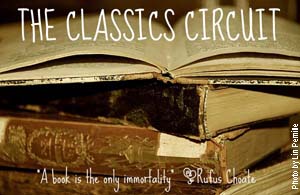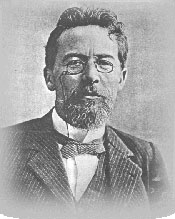Before reading Nine Humorous Tales I mostly knew Russian writer Anton Chekov from his plays like The Seagull and The Cherry Orchard. Turns out he was also considered a master of the short story, so when he came up on The Classics Circuit I decided to try a collection of those.
I decided on Nine Humorous Tales, a book I could get for free on my nook via Google Books. The nine stories are all quite short – the book is only 67 pages online – and don’t take much time to get through.
In the introduction, Chekhov is compared to American short story writer O. Henry, particularly the first two stories in the collection: “A Work of Art” and “Vengeance.” As the introduction explains:
“They are told with that same breeziness, that same crispness, and end with that same ‘punch’ as characterize the America’s work. … If O. Henry may be called the American Chekov with a ‘punch,’ Chekhov may be equally termed the Russian O. Henry with a caress.”
I’ve always liked O. Henry, even if I haven’t read as much of him as I’d like to. But from what I remember, I think that sums up my impressions of Chekhov versus O. Henry and my thoughts on the collection quite succinctly.
Of the nine stories, the first two were my favorites. In “A Work of Art,” a young man named Sasha offers a gift to a doctor as a thank you for saving his life. The gift is “a low candelabrum of antique bronze” with two figures that were,
“smiling coquettishly and in general gave one the impression that, were it not for the fact that they were obliged to support the candle-stick, they would leap down from their pedestal and exhibit a performance which… my dear read, I am even ashamed to think of it!”
The Doctor tries to refuse the gift, but Sasha insists. Convinced he cannot have such a lewd object in his home, the Doctor passes the gift to a friend who in turn passes it on. And then there’s the O. Henry-esque twist, but I can’t tell you that!
The second story, “Vengance,” is about a man name Savvitch who overhears his wife and friend plotting an affair. Determined to make the man look like a fool, Savvitch comes up with a plan he believes will get the man arrested. Hijinks ensue.
What I liked about these two was the sense of playfulness they had. The narrator’s voice was wry and sarcastic, which keeps otherwise simple stories from being boring. The rest of the collection was a little bit more serious, but only in the sense that there wasn’t some sort of twist near the end. Still, the stories are much more about plot and situation than they are about in-depth characters.
In one, Chekhov writes about a vain prostitute just out of jail trying to dupe her previous “gentlemen friends” out of some money for new and fashionable clothes. In another, an old colonel tells a potentially racy haunted house story to a group of young ladies.
None of these characters are especially deep, but they do tell some nice vignettes about life in Russia and situations where characters don’t understand each other, to humorous results.
If you haven’t read any of Chekhov’s short stories, I recommend them. This short collection is available to read via Google Books.
 This post is part of The Classics Circuit Imperial Russian Tour. For more information about this tour or upcoming events, visit their website. Thanks for the opportunity to let me host about this very funny Russian author.
This post is part of The Classics Circuit Imperial Russian Tour. For more information about this tour or upcoming events, visit their website. Thanks for the opportunity to let me host about this very funny Russian author.


Comments on this entry are closed.
I really enjoy Checkov’s work, but with any short stories, I don’t like to read more than one or two at a time. If I read them all in a row like in a collection, I find I enjoy the first couple most and barely remember the rest!
Amanda: I read this straight though, and I think that’s part of what happened. I remember the first few best, but I do also think they were written better than the others.
These sound really fun, and not like most of the short stories I tend to tackle (and then not really enjoy…). These seem like they’re more whimsical and fun, and probably do lend themselves to just reading a few at a time. I was doing that with Dorothy Parker for a while, but the collection of hers that I have is so long I started to lose steam. Nine sounds like the perfect number!
Steph: They are whimsical and fun. Not exactly cheery, but humorous. Nine is a good number because it wouldn’t take long to read them through even if you just do a couple of them each day.
I’m convinced! I’ll be downloading this from Google Books asap. I’ve never read Chekhov which is just SICK because I really adore short stories. I have one of his collections at home, too.
Andi: Awesome! I hope you like them 🙂
Yay for the Russians on the Classics Circuit! I loved Dostoevsky’s House of the Dead. I’ll have to start reading Chekhov.
Trisha: I’m glad the Russians have been well-received by people. I have a couple big Russian novels downloaded on my nook, but haven’t read them yet.
I really liked the collection of Chekhov stories I read a couple of years ago. I really should revisit him, because I love his approach to human character!
Rebecca: I think you’re exactly right — they are stories about human choices and character, and Chekhov has a keen sense for it.
One of the best two word sentences ever! “Hijinks ensue.” Glad you enjoyed these.
Care: Ha ha, thanks 🙂
I have read some of Chekov’s plays in various classes but never really knew he was also known for short stories. I always enjoyed the plays so I’ll have to try a few of these out sometime.
Jennifer: I didn’t know he wrote short stories either, so I was pleasantly surprised to find these.
Now I have to at least find and read the first short story you mention — to find out what happens to the candelabra (and the characters)! The rest sounds interesting, too.
Valerie: The first story is available online via the link in the post — I hope you like it!